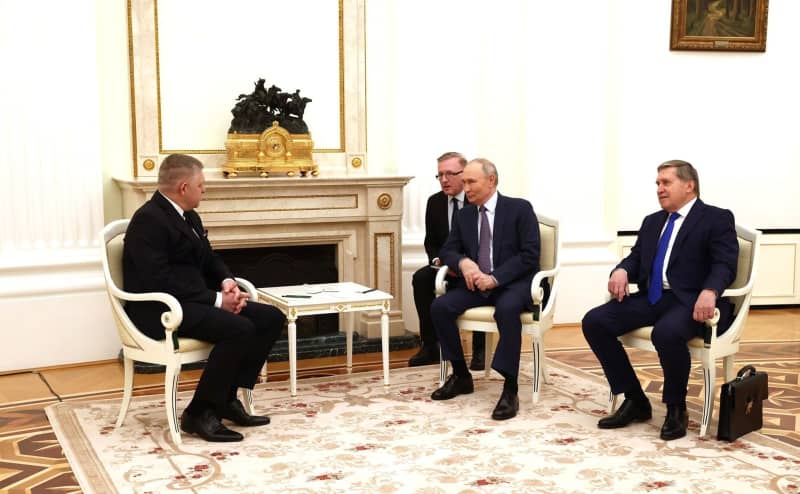Slovakian Prime Minister Robert Fico’s recent visit to the Kremlin marked a significant and controversial moment in Slovak-Russian relations. The visit was unannounced and was the first by a Slovak official to Russia since the onset of the full-scale invasion of Ukraine by Russia in February 2022. This meeting has drawn considerable dismay among opposition lawmakers in Bratislava, especially given the growing rarity of interactions between EU leaders and the Kremlin amid ongoing geopolitical tensions. The discussions reportedly focused on natural gas supplies—a critical issue for Slovakia, which is heavily reliant on Russian energy. Kremlin spokesman Dmitry Peskov hinted that this would be a central point of discussion during Fico’s talks with Putin.
Fico, often labeled as “pro-Russian” by his opponents, has also made plans to return to Moscow in May 2025 for the World War II centennial commemorations, a move that further solidifies his controversial standing as the head of government. Criticism has intensified from various opposition leaders who argue that Fico should be in Kyiv negotiating for gas transit rather than making overtures to Putin. Michal Simecka, leader of the largest opposition party, condemned the visit, asserting that Fico’s actions only serve to mislead his constituents and distance Slovakia from its European allies. This sentiment reflects a broader concern among opposition factions regarding Fico’s foreign policy approach and his tendency to challenge established EU and NATO positions.
The backlash to Fico’s Kremlin visit has been vehement. Branislav Gröhling, leader of the smaller liberal opposition party Freedom and Solidarity (SaS), articulated a deep sense of betrayal, accusing Fico of undermining Slovakia’s sovereignty by appearing to collaborate with a regime that is in stark opposition to much of Europe. Gröhling emphasized that Fico does not represent the views of the entire Slovak populace, echoing a sentiment of frustration shared by many regarding the Prime Minister’s foreign policy approach. Fico’s visit coincided with his struggle to secure the continuation of Russian gas transit through Ukraine—a source of immense concern for Slovakia as it grapples with energy dependence in the wake of restrictive geopolitical developments.
The narrative around Fico’s visit must also consider the backdrop of Slovakia’s energy landscape, heavily reliant on Russian gas supplies due to limited alternatives. Despite the European Union granting Slovakia permission to continue purchasing Russian gas, this has been compromised by Ukraine’s announcement to cease transit, leaving Slovakia in a precarious position. Fico’s recent diplomatic encounters with Ukrainian President Volodymyr Zelensky highlighted the nuances of these tensions; Zelensky pointedly remarked on the grave cost of the simmering conflict, reiterating that while Slovakia faced economic woes, Ukraine endured daily human losses.
As one of the few neighboring countries supporting Ukraine’s military and humanitarian efforts post-invasion, Slovakia’s predicament poses challenges for Fico’s leadership. While support for Ukraine remains a cornerstone of EU policy, Fico’s historical criticism of Western strategies, especially those related to arms supplies and military aid, has complicated his government’s stance. Despite reining in direct arms deliveries after returning to power in October 2023, Slovakia’s arms industry continues to supply military goods to Ukraine commercially. This duality creates tension as Fico must navigate public sentiment while managing comprehensive foreign policies.
Ultimately, Fico’s engagement with Russia amidst the Ukraine conflict raises crucial questions about Slovakia’s role within the broader European framework. His recent actions reveal a divergence from what is expected of an EU member state amid the ongoing crisis. Critics argue that by courting relations with Putin, Fico is undermining Slovakia’s commitments to collective European security and solidarity, fueling concerns about the nation’s foreign policy trajectory. As Slovakia grapples with its energy vulnerabilities, domestic political dynamics, and its place in the EU, Fico’s leadership will be a focal point for evaluating the nation’s future in a rapidly evolving geopolitical landscape.

